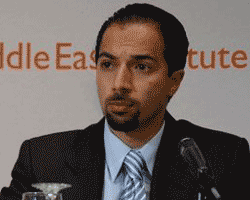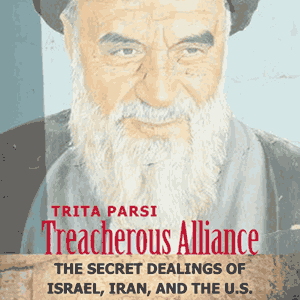
Iran scholar Trita Parsi has been arguing for a while that Iran is a rational, pragmatic actor in the Middle East, not an uncontainable rogue state on an unswerving path to nuclear holocaust, as the country is so often portrayed. President of the National Iranian American Council, Parsi believes that a serious diplomatic push could achieve a détente between Iran and Israel and the United States. On Monday, his analysis received a whopping vote of confidence with the release of the National Intelligence Estimate on Iran, which represents the consensus of 16 U.S. intelligence agencies. Besides stating with “high confidence” that Iran halted its nuclear weapons program in 2003, the report (pdf) concludes that the country might well respond to “[s]ome combination of threats of intensified international scrutiny and pressures, along with opportunities…to achieve its security, prestige, and goals for regional influence.”
Parsi has become the go-to scholar on the issue, with recent appearances on NPR, ABC, and Al Jazeera and quotes in a wide range of print publications. And it’s no wonder: His book, Treacherous Alliance: The Secret Dealings of Iran, Israel and the United States (Yale University Press), released in October, was based on more than 130 face-to-face interviews with officials in Iran, Israel, and the United States. The book traces the complex diplomatic relations among the countries from 1948 to the present and argues that tensions have been rooted more in geopolitical and strategic concerns than in conflicting ideologies. His qualifications include a doctorate from the School of Advanced International Studies at Johns Hopkins, where his adviser was ex-neocon political philosopher Francis Fukuyama. He also served as Rep. Bob Ney’s aide in 2003 when Ney relayed an Iranian proposal for wide-ranging negotiations. On Tuesday, Parsi spoke with Mother Jones about the new NIE and the Annapolis conference—and whether they can alter the future of relations between Iran, Israel, and the United States.
Mother Jones: Speaking at the World Affairs Council in San Francisco last month, you said you feared a military confrontation within months between Iran and America or Iran and Israel. How much does the new NIE change that calculus?
Trita Parsi: I think the NIE presents a major obstacle to those who are pushing for military confrontation. In many ways it is a severe blow to their agenda. However, I wouldn’t go as far as to say that the risk has been significantly reduced or eliminated. As you saw from the press conference, the president didn’t seem to be too impressed by the fact that the NIE completely contradicts the fundamentals that his policy is based on.
MJ: What did you make of President Bush’s assessment that Iran still presents a “danger…to the world”?
TP: I do believe that the very tense relationship between the United States and Iran presents a challenge to the United States. But to discuss Iran as that type of a threat I find somewhat unconvincing, mindful of the fact that Iran actually doesn’t have those military capabilities that would be needed to refer to it as that type of threat. Iran has, by virtue of its growth and by virtue of the United States’ mistakes in Iraq, tilted the balance of power in the Middle East. That is the case, but that doesn’t necessarily mean it is a threat.
MJ: Do you think the media has been overplaying this story—doesn’t the NIE essentially confirm what the International Atomic Energy Agency has been saying for a while now about Iran’s lack of a nuclear weapons program?
TP: It certainly is very reflective of what the IAEA has been saying. The problem of course is that it does not matter when the IAEA is saying it; it only matters when U.S. intelligence says it. We dismissed the intelligence findings of the IAEA on Iraq and we have been dismissing them quite extensively on Iran as well. But now the U.S. national intelligence services are basically siding with the IAEA, and that definitely makes a difference.
MJ: People like Michael Ledeen and Norman Podhoretz are already casting doubt on the veracity of the NIE report, saying this is somehow political sabotage of the Bush administration by the intelligence agencies. How do you assess the NIE’s conclusions?
TP: Well, first of all, I think the intelligence services would probably be in a better position to make an assessment of the advancement of the Iranian nuclear program than Podhoretz or Ledeen. They don’t have access to any specific information. So for them to dismiss it has no great value because they have no authority whatsoever on this issue. For them to push forward with their efforts to get a war started between the U.S. and Iran, you certainly cannot say that Iran does not have a nuclear program. If you say that, then the justification for war has basically been eliminated. So it’s quite understandable that they are very frustrated and upset.

MJ: Do you think the NIE report’s claims are reliable?
TP: People from the IAEA have been saying this for quite some time, including at a conference we held on Capitol Hill in February. One of the former IAEA officials there said exactly what the NIE is saying. There seems to be a consistency, in that people who have had access to the Iranian program—people who actually have had boots on the ground and have been able to investigate and inspect the program—have consistently been saying these things. And then those who are countering it tend to be the ones who have had no access to Iran for the last 30 years.
MJ: Do you think the NIE revelations will affect Iran’s behavior or policies in the region?
TP: There certainly is a risk that the Iranians will become a little bit too excited about this and perhaps overplay their hand. It’s important to understand that while this report has confidence that there is not a nuclear weapons program, it does not in any way, shape, or form take Iran off the hook. There are still remaining questions about Iran’s nuclear past. The case is still before the Security Council. But to justify military action when the intelligence says that there is no military program is quite astonishing.
MJ: There have been several reports suggesting the Bush administration has known about this intelligence for at least several months. Assuming that’s the case, why has the administration been so intent on ramping up tensions and talking about World War III?
TP: At the end of day I think it is about the balance of power in the region. I think it is about the fact that Iran is challenging America’s position in the region. The United States has weakened itself with Iraq; Iranians feel victorious—they feel capable of filling the void. I think from the very outset the nuclear issue has been secondary to the more strategic outlook, in which the United States has, since 1991, pursued a policy that it cannot permit any country in the region to become too powerful and challenge American hegemony.
MJ: Israeli Defense Minister Ehud Barak was quoted Tuesday as saying he wasn’t convinced Iran doesn’t have a nuclear weapons program. What is the outlook for Israeli-Iranian relations?
TP: From the Israeli perspective, the fear is that if pressure is off of Iran, Israel would be left having to accept the balance of power in the region significantly shifting toward Iran. It’s not an existential threat, but it would definitely be a problem for Israel. Beyond that is the fear that the United States will end up negotiating and agreeing to a deal with Iran. The Israelis do not like that either because they fear the deal will come at the expense of Israel’s security interests. From an Israeli perspective, the NIE makes the risk of some sort of settlement much greater.
MJ: A Democratic congressional staffer told our national security correspondent, Laura Rozen, that because the NIE could set back efforts to get a new round of economic sanctions through the Security Council, Dick Cheney and others would be able to argue that diplomacy had failed and an attack was the only option. Do you see this as a possible scenario?
TP: There are so many flaws in that reasoning. First of all, certainly there’s a risk that the U.S. will stand on a very weak leg arguing for harsher sanctions against Iran when its own NIE is questioning the fundamentals of the policy. Secondly, those who are pushing for sanctions are constantly using the argument, “Oh, if we do not impose sanctions, the Bush administration hawks will pursue a military option,” and then they characterize sanctions as diplomacy. Well, sanctions are not diplomacy. Diplomacy means negotiation, not trying to hurt the other side economically. Now, within diplomacy, obviously, you can use sanctions, but that’s within diplomacy. There is no diplomacy going on right now. With the NIE coming out, I think the argument that “If you do not impose sanctions, Cheney will be able to bomb” has far less credibility. On the contrary, it’s going to be more difficult to pursue a policy of military action, and, as a result, the argument that you have to pursue sanctions will in itself also be weakened.
MJ: Do you think the new NIE presents any kind of opportunity to improve relations between America and Iran or perhaps Iran and Israel?
TP: Much more is needed than the NIE to get in that direction. What it has done, in the short term, is reduce the likelihood of a quick push for military action.
MJ: Does the Annapolis conference have any long-term significance with regard to relations between America, Israel, and Iran?
TP: Unfortunately, every time the United States has tried to pursue a peace deal between the Israelis and the Palestinians by beating back Iran and trying to isolate Iran, it has failed. And it has failed under much better circumstances. I do not think Annapolis is that significant. On the contrary, I think Annapolis can backfire. Just for people to show up is no longer sufficient, and it has not been sufficient for quite some time. If they all come and nothing comes out of it, that can be very dangerous and can end up benefiting the very same people the United States seeks to isolate.

















